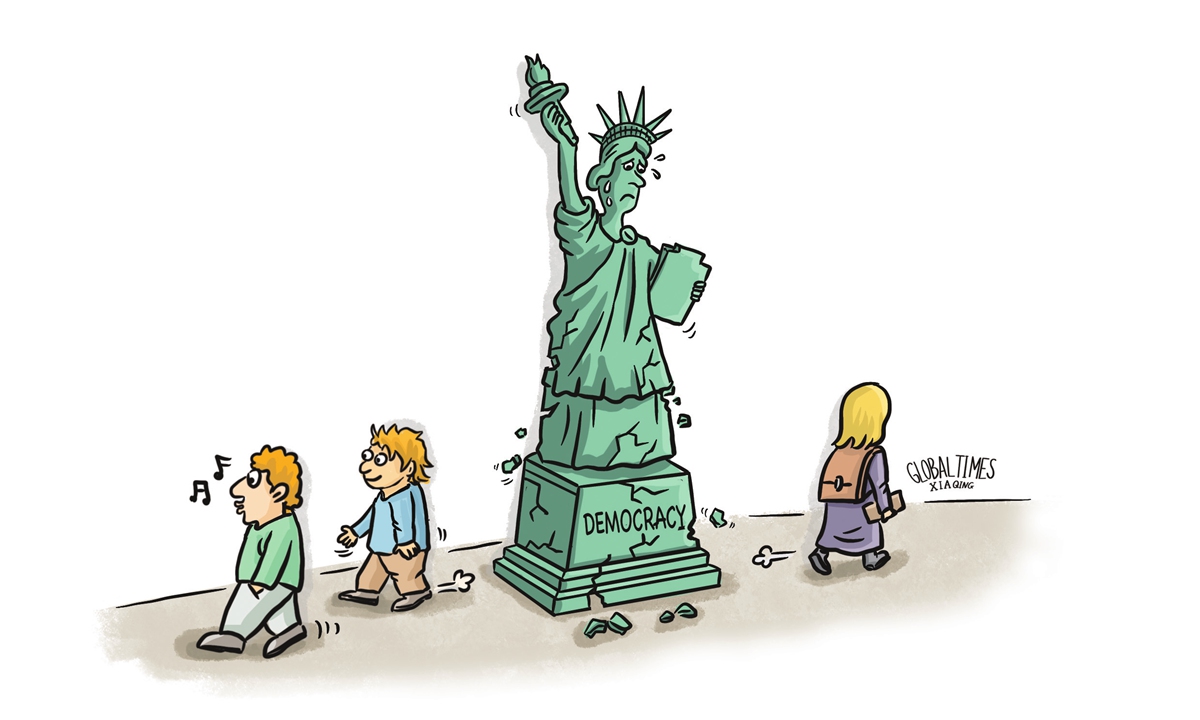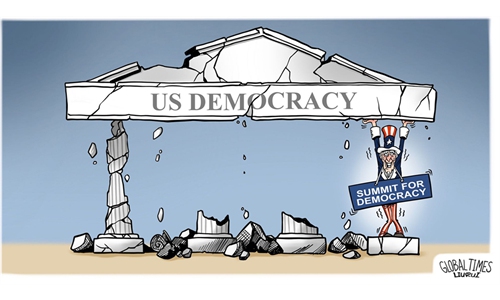When US youth is disillusioned in American democracy, how can it rekindle global passion?

Illustration: Xia Qing/GT
A national poll of 18-29 years olds in the US released on Wednesday by the Institute of Politics at Harvard Kennedy School indicates that only 7 percent view the US as a "healthy democracy" while 52 percent believe that democracy is either "in trouble" or "failing" in the nation.The results of this poll are credible since young people at the age of 18-29 tend to be straightforward about what they really think without too much influence from interest groups. The rather low figure of 7 percent indicates that American young people, especially college students growing up in the past 20 years are generally dissatisfied with the environment they have lived in, as well as with the operation of the US system and its policies at home and abroad.
Although the US prides itself on being a democracy, the low functioning quality of US democracy can be objectively revealed through this poll. For many young people, in particular college students, what they have learned from books is clearly different from the reality they experienced. Under the rosy story of US democracy which has been fabricated as a lighthouse and mountaintop in the world for quite a long time, what the young people in the US see is the soaring number of the poor, shrinking middle class while the elites have concentrated wealth ignoring the public good.
Democracy itself is not a bad thing. However, the functioning quality of US democracy has been revealed very bitterly in this poll. When the US elites represented by Joe Biden preach American democracy at home and in other countries, using it as their most powerful weapon, they'd better look at the real thoughts from American young people about its own democracy first.
With such a mess, the US promotion of its democracy will eventually lead to American grassroots becoming further distanced from the elites, as well as other countries' distancing themselves from the US. More radical politicians like Donald Trump will emerge in US society, as the US is gradually isolated from the world.
Support for Biden has also declined across the board since the last Harvard Youth Poll conducted in the spring, as the job approval rate during Biden's presidency dropped from 59 percent to 46 percent. It is normal for young people to be dissatisfied with Biden, who so far has failed to rein in the virus or unite US political parties. Young Americans also see no improvement in issues like student loans or employment. They believe Biden's policies still favor Wall Street. This is why their approval rate for Biden has dropped.
In the US' one-person-one-vote democracy, as soon as the elections are over, the voters are ignored. The US is often so proud of flaunting its democracy. Yet its system is far from serving the interests of the vast majority. The quality of US democracy is quite low, where the grassroots are mostly manipulated. It is Wall Street, large corporations and investment banks which are manipulating US policies and elections. The US democracy is never real democracy, but is drowning in money.
The upcoming Summit for Democracy will hardly reach US' expectations. It is merely a fair for Biden to satisfy his vanity. The president promised to hold the summit during his election campaign. Thus, he has to carry the plan out to honor his words. The midterm election is approaching. Washington is hoping to rekindle the world's passion toward the US through the summit.
But the poll shows even young Americans are indifferent toward US democracy. Against this backdrop, how could the US win other countries' support any time soon? While Biden is busy organizing such big events, he is turning a blind eye to the actual demands of ordinary people, ranging from medical care to income. Putting 110 heads of states and regions together is simply a waste of time. Worse, it might even let more countries realize how terrible the US is in practicing democracy, and how calculating the US is to make others coordinate its own goals. Doing so will not help more people re-ignite the passion toward American democracy.
The author is a professor at the Institute of International Relations at China Foreign Affairs University.

